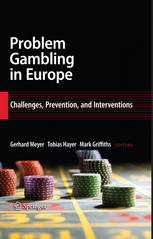

Most ebook files are in PDF format, so you can easily read them using various software such as Foxit Reader or directly on the Google Chrome browser.
Some ebook files are released by publishers in other formats such as .awz, .mobi, .epub, .fb2, etc. You may need to install specific software to read these formats on mobile/PC, such as Calibre.
Please read the tutorial at this link: https://ebookbell.com/faq
We offer FREE conversion to the popular formats you request; however, this may take some time. Therefore, right after payment, please email us, and we will try to provide the service as quickly as possible.
For some exceptional file formats or broken links (if any), please refrain from opening any disputes. Instead, email us first, and we will try to assist within a maximum of 6 hours.
EbookBell Team

4.7
46 reviewsProblem Gambling in Europe
Challenges, Prevention, and Interventions
Edited by Gerhard Meyer, University of Bremen, Germany
Tobias Hayer, University of Bremen, Germany
Mark Griffiths, Nottingham Trent University, United Kingdom
As a leisure activity, gambling dates back to ancient times. More recently, the surge in avenues for gambling—casinos, sports betting, lotteries, and remote media (e.g.,Internet, mobile phone, interactive television) among them—finds growing numbers of people losing control over their gambling behaviour, usually at great personal and financial expense. Problem Gambling in Europe is the first book to offer a robust international knowledge base compiled by an interdisciplinary panel of researchers in gambling behaviour.
Reports from 21 countries throughout Western, Eastern, Northern, and Southern Europe reveal wide variations in types of wagering activities, participation by populations, social and criminal consequences related to pathological gambling, the extent to which governments acknowledge the problem, and efforts to control it (often with the involvement of the gaming industries). For each country, noted experts discuss:
Problem Gambling in Europe brings insight and clarity to a widespread and complex phenomenon, and will be of considerable interest to all parties working to reduce their negative effects: social science researchers in addictions, gambling behaviour, and public health; clinical, social, and health psychologists and psychiatrists; treatment practitioners; the gaming industry; regulators; and policy makers.